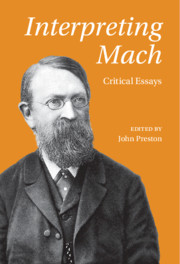Book contents
- Interpreting Mach
- Interpreting Mach
- Copyright page
- Dedication
- Contents
- Figures
- Tables
- Contributors
- Introduction
- 1 Ernst Mach’s Piano and the Making of a Psychophysical Imaginarium
- 2 Mother’s Milk and More
- 3 Meaningful Work
- 4 Mach on Analogy in Science
- 5 Ernst Mach’s Enlightenment Pragmatism
- 6 On the Philosophical and Scientific Relationship between Ernst Mach and William James
- 7 Ernst Mach and Friedrich Nietzsche
- 8 Abstraction, Pragmatism, and History in Mach’s Economy of Science
- 9 Holding the Hand of History
- 10 Ernst Mach and the Vienna Circle
- 11 Narratives Divided
- 12 Phenomenalism, or Neutral Monism, in Mach’s Analysis of Sensations?
- 13 The Case for Mach’s Neutral Monism
- Index
- References
7 - Ernst Mach and Friedrich Nietzsche
On the Prejudices of Scientists
Published online by Cambridge University Press: 05 March 2021
- Interpreting Mach
- Interpreting Mach
- Copyright page
- Dedication
- Contents
- Figures
- Tables
- Contributors
- Introduction
- 1 Ernst Mach’s Piano and the Making of a Psychophysical Imaginarium
- 2 Mother’s Milk and More
- 3 Meaningful Work
- 4 Mach on Analogy in Science
- 5 Ernst Mach’s Enlightenment Pragmatism
- 6 On the Philosophical and Scientific Relationship between Ernst Mach and William James
- 7 Ernst Mach and Friedrich Nietzsche
- 8 Abstraction, Pragmatism, and History in Mach’s Economy of Science
- 9 Holding the Hand of History
- 10 Ernst Mach and the Vienna Circle
- 11 Narratives Divided
- 12 Phenomenalism, or Neutral Monism, in Mach’s Analysis of Sensations?
- 13 The Case for Mach’s Neutral Monism
- Index
- References
Summary
The aim of this chapter is to provide a thorough account of the fact that Ernst Mach and Friedrich Nietzsche are often associated with each other in the specialised literature on the history of philosophy and the philosophy of science. I argue that the consistency which can be discovered between them is much more substantial than one may imagine. On the basis of their conception of knowledge and truth, it is possible to outline a complete parallelism between their approach to the issue concerning our intellectual relationship with the external world. In fact, Mach and Nietzsche dealt with the very same questions and indeed pursued a common general aim, namely the elimination of worn-out conceptions from the world of modern culture. Furthermore, I will maintain that Mach’s and Nietzsche’s research interests converge on the classic problem of realism versus anti-realism, and that it is in the light of this particular issue that their own views can be compared.
- Type
- Chapter
- Information
- Interpreting MachCritical Essays, pp. 123 - 141Publisher: Cambridge University PressPrint publication year: 2021
References
- 1
- Cited by



